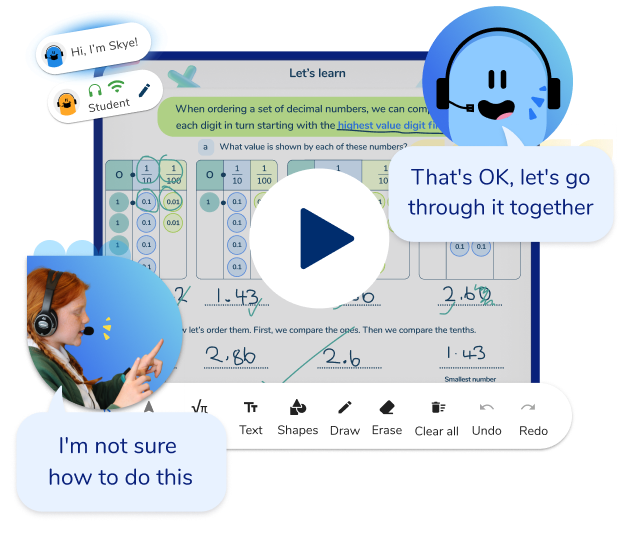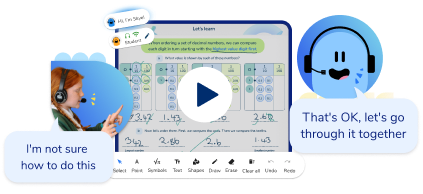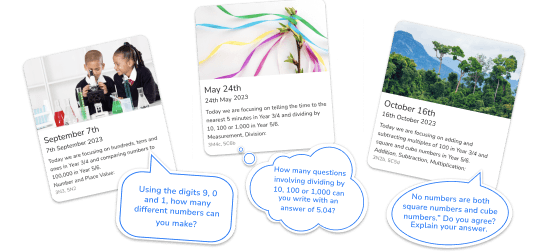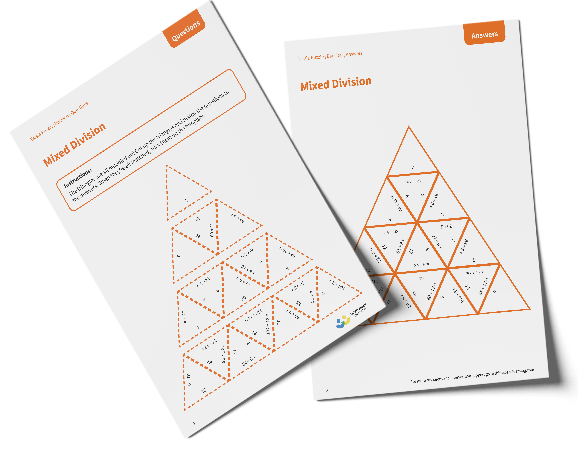Home Learning Ideas, Activities and Guides For Primary and Secondary School Teachers
Originally published on 19th March 2020.
Home learning can be challenging. Here, you’ll find links to all the home learning maths support available for schools from Third Space Learning. Originally created during the Covid-19 pandemic, it’s still available for schools to provide to pupils and their families during any other school closures.
Here’s how Third Space Learning can support home learning:
- Our one to one maths tuition continues to run for children in school
- If you are registered for our maths hub (it’s free for teachers and parents to register) you can access a range of free downloadable maths resources all created to help practise and revise the essential maths skills that children in Years 1 to 6 need. Look out for the home learning section.
- As well as the widely read articles for teachers and school leaders on the Third Space Learning blog we have added many articles designed to help demystify the maths curriculum and provide as much help and home learning ideas as possible for those supporting their children with maths at home. These are all linked from this page.
We’ve been supporting schools with online one to one tuition for over 10 years now, helping to raise attainment in maths across over 150,000 pupils.
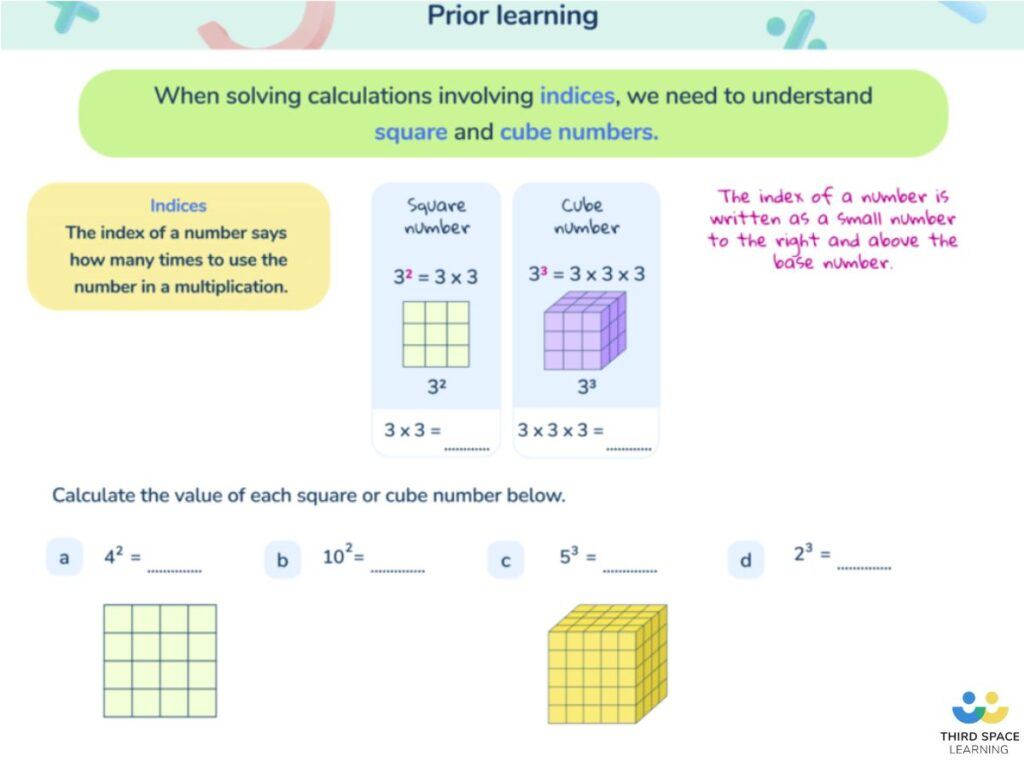
Our one-to-one maths programmes take place online with tutor support in schools. To raise attainment across the school, not only among those pupils receiving one-to-one tuition, schools additionally have premium access to our Maths Hub, home to hundreds of quality teaching resources and CPD.
In this blog, we’ve brought together a collection of guides, advice, tips and additional teaching resources that you can share with parents to continue pupils’ learning at home, or fill in any learning gaps as needed.
Download free maths resources from our mathshub
Find what you need in our collection of free and premium maths resources for teachers and parents. Register to join for free (works best with Google Chrome).
Download Free Now!How to use these home learning ideas and activities
When it comes to home learning, as any Headteacher or Senior Leader knows, it’s not enough to just provide an online learning equivalent. Not only does the quality and quantity of online devices and computers at home vary hugely, but parents will also have varying capacities in their time or confidence to keep children going.
So, to help your parents get the most of the free resources we know you will be providing them with, we’ve brought together the following collection of guides, advice, tips and additional teaching resources, all centred around teaching maths. Every blog post contains ideas to keep children busy and engaged in maths at home and they’ve all been written with parents in mind.
We recommend adding a link to this page on your own school website to provide another source of support and guidance for parents on their home learning journey.
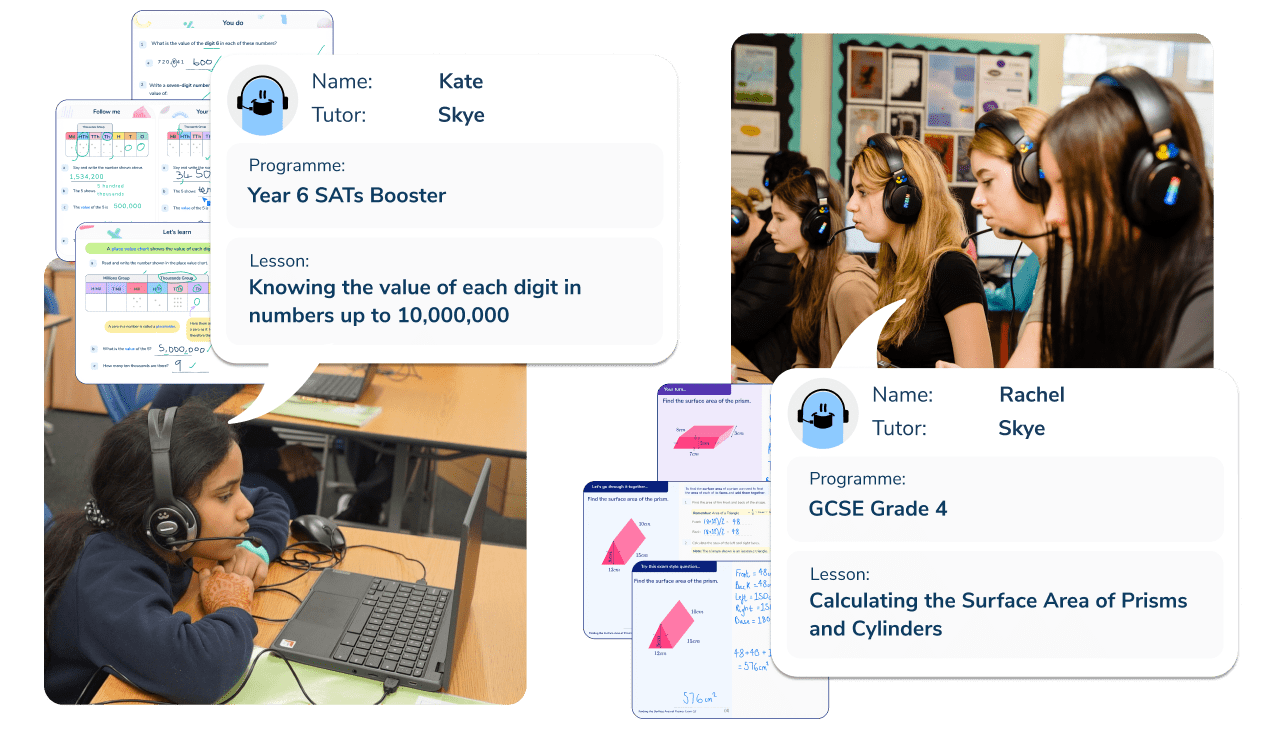
Meet Skye, the voice-based AI tutor making maths success possible for every student.
Built by teachers and maths experts, Skye uses the same pedagogy, curriculum and lesson structure as our traditional tutoring.
But, with more flexibility and a lower cost, schools can scale online maths tutoring to support every student who needs it.
Watch Skye in actionFree Home Learning Packs
If you’re a class teacher or parent looking for education resources specifically to help children with maths at home take a look at this list of all free home learning packs available to you.
These are online resources all available to use at home, with a range of free activities and lesson plans included in them. They’re ideal for homeschooling young people aged 5 to 12.
Why it’s all about maths
All our tutors are maths specialists, our one to one tuition lessons tackle every topic in the primary maths curriculum and we confidently believe that our maths resources are the best available for schools and parents. However we aren’t yet English teaching specialists so you won’t find any English, PSHE or other subjects here. For them we recommend you seek out other high quality providers – BBC Bitesize is often a good starting point.
Home Learning Maths Curriculum Guides For Parents
As with teachers there’s a vast range in what parents already know about the primary maths curriculum and the transition to secondary maths. We’ve created these home learning toolkits as practical information guides to hand to parents and carers with children studying maths at school. Each one breaks down what the curriculum expects from learners in maths for each year group and then how parents can help support their children through it.
Year 2 Maths: Home Learning Toolkit for 6 and 7 Year Olds
Year 3 Maths: Home Learning Toolkit for 7 and 8 Year Olds
Year 3 Maths Worksheets
Year 4 Maths: Home Learning Toolkit for 8 and 9 Year Olds
Year 4 Maths Worksheets
Year 5 Maths: Home Learning Toolkit for 9 and 10 Year Olds
Year 5 Maths Worksheets
Year 6 Maths: Home Learning Toolkit for 10 and 11 Year Olds
Year 6 Maths Worksheets
Year 7 Maths: Home Learning Toolkit for 11 and 12 Year Olds
Maths Homework: What Parents Should Know
You may be surprised both by how much parents know about some aspects (ask them about partitioning!) and occasionally by how little (who knew the difference between area and perimeter was so tricky to grasp?). The following guides break down all parents need to know about the major topics at primary school that children struggle with. They are designed so parent and child can work through them together at their own pace as part of their home learning work on maths at home.
- How To Teach Your Child To Learn Times Tables At Home
- How To Teach Your Child To Learn Fractions At Home
- How To Help Your Child When Comparing Fractions, Decimals, And Percentages
- How To Teach Your Child To Learn Short Division and Long Division At Home
And if this still isn’t enough we’ve also brought together a list of our top free maths homework sites and apps
Inspiring A Love of Maths: Why Maths Is Important
Parents as we know are their children’s first influencers and can have an enormous effect on how much children enjoy and even achieve in maths. Here at Third Space Learning, we love maths, we know how important it is and we believe everyone can do it.
But it’s completely normal for some children to struggle, some children to think they hate it, and some even to develop maths anxiety.
The article Why is Maths Important points you to lots of useful information and ideas on how to build up children’s resilience and improve both their attitude to maths and their ability to learn maths, covering topics such as growth mindset and metacognition along the way.
Home Learning Maths Games
As educators, we know it’s not all about fun but, when you’re trying to keep spirits high, injecting a bit of fun into maths at home doesn’t go amiss so keep a look out for our games and activities blogs.
First we’ve got 35 brilliant times tables games to lighten up what can be a bit of a laborious but essential journey to mastering times tables. Then we’ve also collected together our favourite free maths games to do at home just in time for home learning – all you’ll need is a paper and pen, and for some of them, a die or a pack of cards. Hours of fantastic maths fun and it doesn’t even need to stop when you have to go on a journey. We’ve included some activities for car journeys too!
We’re also adding to our collections with free KS2 maths games, KS1 maths games and KS3 maths games for all maths topics.
Primary Maths Curriculum Knowledge Buster
Much of the primary maths curriculum will be new to parents compared with how they were taught, and the terminology may flummox or confuse, so we’d encourage you to point them to our free Primary Maths Dictionary for Kids, deliberately created to help explain some of the trickier and more unusual terms.
All the key terms parents will come across from partitioning to perimeter are included in a dictionary format and then where needed, we provide links to additional guidance such as on BODMAS (or BIDMAS), square numbers, regular and irregular shapes and our favourite, maths word problems.
Each of the additional articles are tackled in a ‘What is’ format, suitable for KS1 and KS2 parents with sample questions and answers and how they are used in the primary maths curriculum. A bit like you’re likely to find on the knowledge organisers your school will hand out to show what children need to learn about a topic.
Topics covered like this so far include:
- What Is The Highest Common Factor
- What Is A Venn Diagram
- What Are Lowest Common Multiples
- What Is Place Value
- What Is A Unit Fraction
- What Is A Line Of Symmetry: Symmetrical Shapes Explained For Primary Parents And Kids
- What Is A Number Sentence: Explained For Primary Parents And Kids!
- What Is The Highest Common Factor: Explained For Primary Parents And Kids
- What Is A Prime Number?
- What Is Partitioning?
- What Is The 12 Hour And 24 Hour Clock?
- What Are Equivalent Fractions
- What Are Concrete Resources
We’re adding to this primary maths dictionary all the time but if we don’t cover it and you need us to, just get in touch [email protected] and we’ll write it for you! We’re open to requests from teachers as well as parents – it’s all valuable CPD.
Home Learning and Primary School Homework
Never will parents have such respect for teachers as they will after 48 hours of home learning. The principles of home learning apply equally to managing children’s homework in ordinary times. Wherever you sit on the homework debate and whether it’s necessary at primary school, most schools still subscribe to some degree of learning taking place at home, whether that’s phonics, weekly spellings, or daily Times Tables Rockstars.
KS1 And KS2 SATs For Parents
Every year we give over 7,000 pupils online maths interventions to support them for their Key Stage 2 SATs. During Covid, SATs were cancelled but now that SATs are back, parents may find some of the tips and information helpful at this time. Plenty of the teaching content and revision techniques are applicable for Year 6 as a whole, not just the end of year assessments. Here is everything parents need to know about the KS1 and KS2 SATs.
We hope this blog helps in some way to support schools and families. Third Space Learning will be operating as usual through the crisis and we’re setting up all children to continue to receive their 1-to-1 maths intervention programmes from home.
Get in touch at [email protected] or on twitter or facebook if you need any support in maths, want to set up your own pupils with interactive one to one maths lessons or just generally fancy a chat. We’re always around!
DO YOU HAVE STUDENTS WHO NEED MORE SUPPORT IN MATHS?
Skye – our AI maths tutor built by teachers – gives students personalised one-to-one lessons that address learning gaps and build confidence.
Since 2013 we’ve taught over 2 million hours of maths lessons to more than 170,000 students to help them become fluent, able mathematicians.
Explore our AI maths tutoring or find out about one to one tuition for your school.
